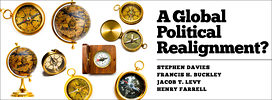Lead Essay
Stephen Davies argues that political realignments are regular features of modern democratic politics. In them, some longstanding issues lose their salience, while others rise to the top of the heap. Because the world is increasingly networked, our realignments are likewise increasingly taking place in concert, Davies argues; he goes on to suggest that nearly the entire industrialized democratic world is currently confronting a realignment that turns it toward questions of populism versus globalization.
Response Essays
Francis H. Buckley argues that American nationalism is nothing like the European variety. American nationalists stand for liberty under law, not an ethnic state. Libertarians, however, cannot easily be nationalists, because nationalism implies solidarity with citizens while denying it to others. On the whole, however, American nationalism is benign, and we should welcome its return to our politics, which began with the 2016 election.
Jacob T. Levy agrees with Stephen Davies that conservatives have recently moved away from moralism and toward national identity. But Levy sees national collectivism as potentially quite durable, a prospect that he does not welcome. He notes that authoritarianism and racism seem to be everywhere in contemporary populism, and he argues that attention to constitutionalism among conservatives has largely disappeared.
Henry Farrell argues that political bitterness across the world arises from a common source: neoliberalism. Domestic politics has been “hollowed out” in that all the real decisions are made by corporations or bureaucrats. Politicians prefer to compete on symbolic, highly contentious issues that are unlikely to be resolved. Liberal cosmopolitanism is “toast,” Farrell writes, because it lacks any significant constituency. As to libertarians, he argues that they should expect even less.
Coming Up
Discussion through the end of the month.
Related at Cato
Cato Unbound: “An Appreciation of Partisanship,” February 2009
Policy Forum: “Populism and Nationalism in the Trump Era,” January 2017
Conference: “Trump’s Attack on the Trade Regime: A Search for Solutions,” October 2018
Policy Forum: “The Return of Great Power Competition,” January 2019 (upcoming)

